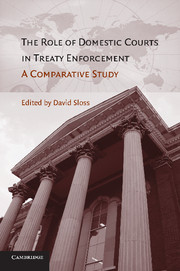Book contents
- Frontmatter
- Contents
- Contributors
- Preface
- Acknowledgments
- 1 Treaty Enforcement in Domestic Courts: A Comparative Analysis
- 2 Does International Law Obligate States to Open Their National Courts to Persons for the Invocation of Treaty Norms That Protect or Benefit Persons?
- 3 Australia
- 4 Canada
- 5 Germany
- 6 India
- 7 Israel
- 8 The Netherlands
- 9 Poland
- 10 Russian Federation
- 11 South Africa
- 12 United Kingdom
- 13 United States
- 14 The Role of Domestic Courts in Treaty Enforcement: Summary and Conclusions
- Index
- References
2 - Does International Law Obligate States to Open Their National Courts to Persons for the Invocation of Treaty Norms That Protect or Benefit Persons?
Published online by Cambridge University Press: 06 January 2010
- Frontmatter
- Contents
- Contributors
- Preface
- Acknowledgments
- 1 Treaty Enforcement in Domestic Courts: A Comparative Analysis
- 2 Does International Law Obligate States to Open Their National Courts to Persons for the Invocation of Treaty Norms That Protect or Benefit Persons?
- 3 Australia
- 4 Canada
- 5 Germany
- 6 India
- 7 Israel
- 8 The Netherlands
- 9 Poland
- 10 Russian Federation
- 11 South Africa
- 12 United Kingdom
- 13 United States
- 14 The Role of Domestic Courts in Treaty Enforcement: Summary and Conclusions
- Index
- References
Summary
INTRODUCTION
In its decisions in the LaGrand and Avena cases, the International Court of Justice (hereinafter, ICJ or the Court) determined that Article 36 of the Vienna Convention on Consular Relations (VCCR) creates “individual rights” (as opposed to just rights of states) and that the United States has an obligation to provide an individual with meaningful access to U.S. courts to vindicate those rights. On the basis of those determinations, it might be thought that international law generally obligates a state to open its courts for private persons to vindicate rights or benefits that a treaty accords to them, whether or not the treaty expressly provides for such a remedy. Such a proposition, however, is overbroad and does not follow from a close reading of the ICJ's decisions or from a more general assessment of the international legal system. This chapter seeks to provide a more nuanced assessment of whether international law generally obligates states to open their national courts to persons in such situations.
Because of the equal sovereign status of states, it is generally accepted in international law that a state cannot and should not sue another state in national courts to vindicate a treaty right. Instead, states normally address the matter through resort to international negotiation or dispute settlement. By contrast, the invocation of treaties in national courts usually arises in the context of actions by or against nonstate actors or private parties (i.e., persons or companies).
- Type
- Chapter
- Information
- The Role of Domestic Courts in Treaty EnforcementA Comparative Study, pp. 61 - 119Publisher: Cambridge University PressPrint publication year: 2009

